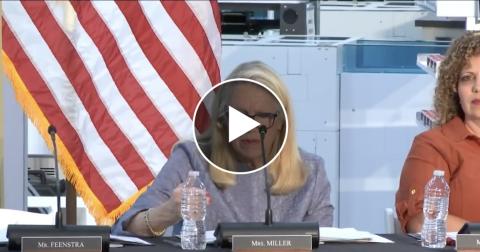Miller Highlights the Importance of Promoting Medical Innovation During Ways and Means Field Hearing
Washington, D.C. – Today, Congresswoman Miller (R-WV) participated in a Ways and Means Committee Field Hearing in Salt Lake City, Utah to discuss the importance of enhancing medical innovation to ensure patients in West Virginia and across America have access to quality health care.

Congresswoman Miller began by discussing the barriers that End Stage Renal Disease (ESRD) patients face and how technology has positively benefited these patients.
“I represent West Virginia, where access to care and innovation can be a challenge for all of our patients. An issue that I am particularly passionate about is care for patients with End Stage Renal Disease. Kidney care does not often see innovation, which I think you are a living example of, which is an extremely pressing issue for us. We’ve also got to consider the very basic challenges rural patients face when they’re trying to access lifesaving dialysis services. Many ESRD patients in my district have to travel for hours to a dialysis center to receive the care they need, dialyze for two to three hours, then drive back home those hours and they must do this three times a week just to survive. This burden on some of our most vulnerable patients is unbearable. Thankfully, the technology exists for patients to receive home dialysis. Home dialysis can be a God send for rural patients, people with jobs, families, or without access to transportation. I have worked very hard in Congress to increase access to home dialysis for ESRD patients,” said Congresswoman Miller.
Congresswoman Miller asked Kasey DeLynn Shakespear, a parent of a rare disease patient and rural health champion, about his experience with providing medical care for his son, Isaac.
“Mr. Shakespear, I’m a mother, I’m a grandmother, and I was so touched by your testimony about your son. [Our] hearts ache just trying to understand all you have been through and how any parent would go to the ends of the earth to save their baby. Unfortunately, for parents like us that live in rural areas, as you have pointed out, there are patients that don’t get care. Can you walk us through what it was like finding care for Isaac? Was it a pediatric nephrologist or a dialysis clinic or was it a social worker [that helped you] navigate the health care [system]?” asked Congresswoman Miller.
“One of the challenges has been that Isaac has received care across many different organizations and unfortunately care coordination across different organizations is very challenging. Throughout the process in the Neonatal Intensive Care Unit (NICU), he was cared for by a wide variety of specialists, but each condition that he came across usually required a different specialist. Most of the burden for coordinating that care was falling on my wife and I. Throughout the process in every hospitalization, we have had to be advocates for our own child and understand the treatments that he was going through and ask questions and be able to explain in clinical terms to the next provider,” responded Mr. Shakespear.
Congresswoman Miller ended her questions by asking Frank Watanabe, the President and CEO of Arcutis Biotherapeutics, how President Trump’s 21% corporate tax rate could be an advantage to medical companies and innovation in the United States.
“Mr. Watanabe, Chairman Smith recently created ten tax teams [made up of Members of this committee] because you all know about the Tax Cuts and Jobs Act. [These teams] are focused on [the 2025 tax cliff and addressing many issues within the tax code.] I am heading [the Supply Chains Tax Team] and what I’m hearing about the most is the corporate tax rate because of President Trump’s work [in 2017]. We tried to create a favorable environment for companies engaged in R&D and it’s disturbing to me that our medical supply chain is heavily reliant on foreign manufacturers. Could you explain to me the benefits of a 21% corporate tax rate and how that helps [medical companies looking to engage in domestic manufacturing?] asked Congresswoman Miller.
“[Most] of the smaller companies are not actually profitable, so we don’t pay taxes at the moment, although we hope to at some time in the very near future. It's also important to understand that small biotechs exist inside of a much larger ecosystem. For example, the importance of mergers and acquisitions (M&A) to finish development and to bring the therapies to patients. So, I think that any change that fosters the health of the overall biotechnology sector in America, like the corporate tax code, will have a very positive effect on the research and development (R&D),” responded Mr. Watanabe.
###